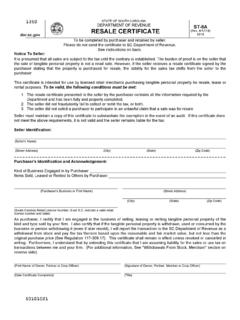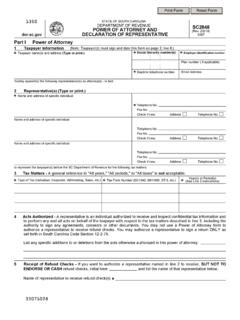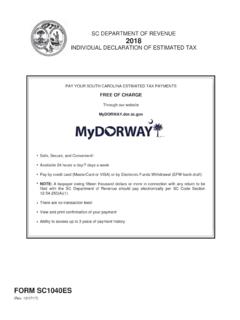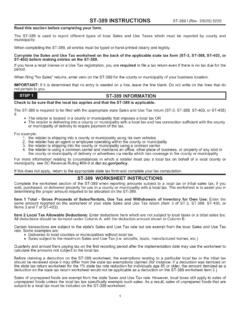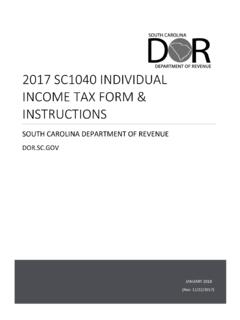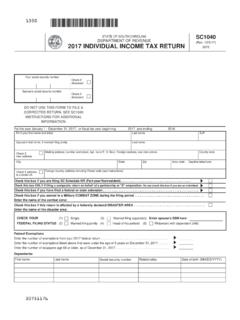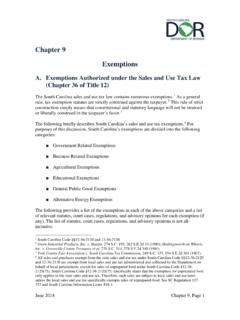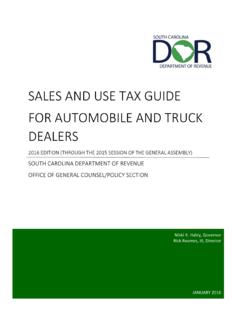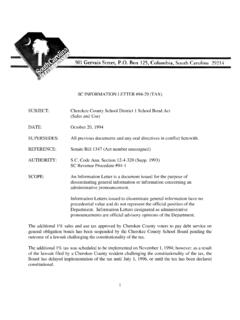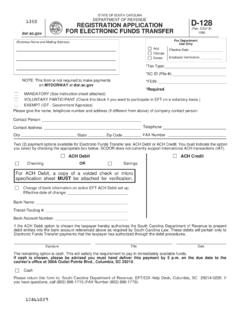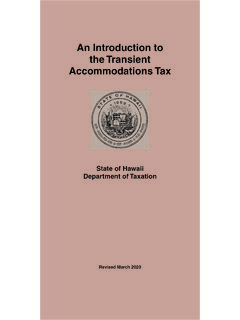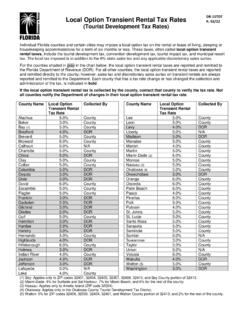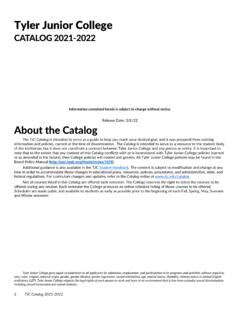Transcription of INSTRUCTIONS FOR SCDOR-111 (Rev. 10/23/20)
1 INSTRUCTIONS FOR SCDOR-111 (Rev. 10/23/20) Register online at Additional Resources: Register your business with the South Carolina Secretary of State's office at Learn more about federal tax laws on the Internal Revenue Service website at Section A: Entity Registration Information Registration Selection - Select the desired account types to which the application applies. The applicable license fee must accompany the application in order for the application to be processed and the license issued. Sales & Use Tax: The Sales & Use Tax category contains several Sales & Use Tax subtypes.
2 Included in this category, for the purpose of the SCDOR-111 application, are Accommodations, Artist & Craftsman, Aviation, Max Tax, Retail, and Use Tax. See Section D, Box 9, for details pertaining to each of these Sales & Use Tax subtypes. Withholding Tax: Withholding Tax is taken out of taxpayer wages to go towards the taxpayers' total yearly income tax liability. Every employer/withholding agent that has an employee earning wages in South Carolina (and who is required to file a return or deposit with the IRS) must make a return or deposit to the SCDOR for any taxes that have been withheld for state purposes.
3 South Carolina requires withholding from: - wages - prizes - royalties - winnings - nonresident contractors (contracts exceeding $10,000) - rental payments made to nonresidents who own five or more residential units or one or more commercial properties in South Carolina - net proceeds going to nonresident sellers of real estate and associated tangible personal property located in South Carolina Wages are taxed in the state in which they are earned unless the employee is working in a state that does not withhold state Income Tax. If the employee is working in South Carolina, regardless of where he/she is a resident,the income earned in South Carolina is taxed by South Carolina.
4 If a South Carolina resident is earning wages in a state that does not have a state Income Tax, the withholding should be for South Carolina. Nonresident Withholding Exemption: South Carolina requires employers to withhold Income Tax from certain payments made to nonresidents. Nonresidents who have activity but no employees in South Carolina can be granted an exemption from statute requirements. Provide a completed I-312, Affidavit of Registration, to the employer or Withholding agent with whom you are contracting. Do not submit the I-312 to the SCDOR. The SCDOR will forward you a letter of verification upon registration Box 1 - Select the appropriate option to indicate type of ownership.
5 Corporations that conduct business in South Carolina, as well as LLCs or LLPs, must first register with the Office of the Secretary of State and do so at least 30 days prior to submitting the SCDOR-111 application. If ownership type is LLC, indicate the filing method of Corporation, Partnership, or Single Member disregarded entity. This filing method must be approved by the IRS. Once IRS election has been granted, forward that information to the SCDOR. If the LLC is a disregarded entity, indicate Single Member in Box 1 and provide single member information in Section B. Ownership types: Corporation: A corporation is a business formed and authorized by law to act as a single taxpayer, although constituted by one or more persons, and is legally endowed with rights and responsibilities.
6 It is advisable to consult a lawyer when organizing a corporation to assure full compliance with state and federal laws. Limited Liability Company (LLC): A limited liability company is an unincorporated business association that provide its owners (members) limited liability and flexible management and financial alternatives. An LLC provides the limited personal liability of corporations. An LLC can elect to be taxed as a corporation. A multiple member LLC not taxed as a corporation is taxed as a partnership. - Note on Single Member LLCs: A Single member LLC that does not elect to be taxed as a corporation for federal income tax purposes is said to be disregarded for state tax purposes, in the sense that it is not considered to be an entity separate from its owner.
7 The revenue, expense, income, assets, liabilities, and equity of the disregarded entity will flow up to the owner from the corporation as if it were a division of the owner. Therefore, a single member who is a corporation reports income from the single member LLC as income from one of its divisions. For an individual member income from a single member LLC is most likely Schedule C income. Partnership: A partnership is a legal entity that is jointly owned by two or more entities. As in the sole proprietorship, the owners are personally responsible for all debts of the business, even those in excess of the amount invested in the business.
8 Sole proprietorship: A sole proprietorship is a business owned by an individual who is solely responsible for all aspects of the business. The owner is personally responsible for all debts of the business, even in excess of the amount invested in the business. Box 2 - Enter the Federal Employer Identification Number or Social Security Number to be utilized for registration. FEIN - Contact the IRS and apply for an FEIN using Form SS-4. SSN - When applying as a Sole Proprietorship, enter the Social Security Number. See the Social Security Privacy Act on the SCDOR-111 .
9 Sole Proprietors registering for Withholding are required to obtain an FEIN. Box 3 - Enter legal name and any applicable Doing Business As (DBA) name. Box 4 - Indicate the status of your CL-1 (Initial Report of Corporations) fee. This is not applicable for Sole Proprietors. Box 5 - Enter the state and date of incorporation for the entity. Section B: Owner, Partner, Officer, and Member Information Enter the Social Security Number, printed name, title, phone number, home address, and percentage of ownership, for all owners, partners, officers, and members. Do not include limited partners. Section C: Business Addresses Mailing - Enter the complete mailing address for the business.
10 Location or Physical Address - Enter the complete physical location of the business including any suite or unit letters and numbers. This address cannot be a PO Box nor any other mail service center address. Municipality is required. Section D: Account Details Retail License - $50, Artist & Craftsman's License - $20, Use Tax Certificate - No Fee Box 6 - Describe the main business activity: Retail - Describe the products to be sold (apparel, furniture, cars, groceries, etc.). Manufacturing - Describe the products to be manufactured. Service - Describe the type of service to be offered.
